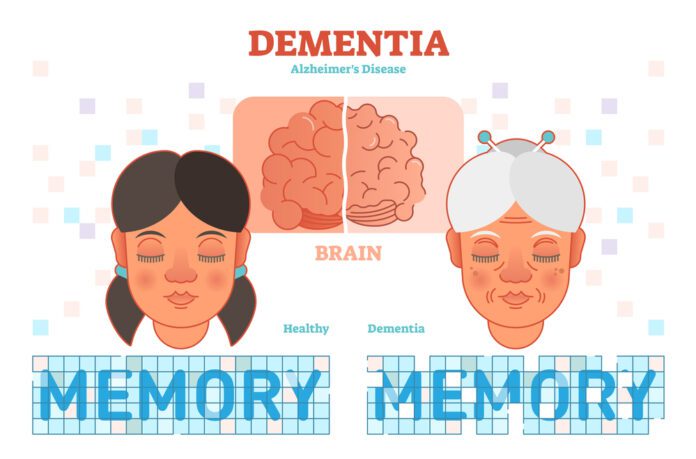Overview
Alzheimer’s disease is one type of dementia, but it’s not the only one. Dementia is a general term for a decline in mental ability severe enough to interfere with daily life. Alzheimer’s is the most common cause of dementia in older adults. It is a progressive brain disorder that slowly destroys memory and thinking skills. It is not a normal part of aging.
Cause
The exact cause of Alzheimer’s disease is not known. Research shows that certain changes in the brain lead to Alzheimer’s disease.
You are more likely to develop Alzheimer disease if you:
- Are older — Developing Alzheimer’s disease is not a part of normal aging.
- Have a close relative, such as a brother, sister, or parent with Alzheimer’s disease.
- Have certain genes linked to Alzheimer’s disease.
The following may also increase the risk:
- Being female
- Having heart and blood vessel problems due to high cholesterol
- History of head trauma
There are two types of Alzheimer disease:
Early onset Alzheimer disease — Symptoms appear before age 60. This type is much less common than late onset. It tends to get worse quickly. Early onset disease can run in families. Several genes have been identified.
Late onset Alzheimer disease — This is the most common type. It occurs in people age 60 and older. It may run in some families, but the role of genes is less clear.
Symptoms
Symptoms of Alzheimer’s – Top 10 Warning Signs
•Memory loss that disrupts daily life
•Challenges in planning or solving problems
•Difficulty completing familiar tasks
•Confusion with time or place
•Trouble understanding visual images and spatial relationships
•New problems with words in speaking or writing
•Misplacing things and losing the ability to retrace steps
•Decreased or poor judgment
•Withdrawal from work or social activities
•Changes in mood and personality
Treatment
While there is no cure for Alzheimer’s disease or a way to stop or slow its progression, there are drug and non-drug (such as Ayurvedic or non-traditional) options that may help treat symptoms. Understanding other available options can help individuals living with the disease and their caregivers to cope with symptoms and improve quality of life.
Other
A skilled health care provider can often diagnose Alzheimer disease with the following steps:
- Performing a complete physical exam, including a nervous system exam
- Asking about the person’s medical history and symptoms
- Mental function tests (mental status examination)
- A diagnosis of Alzheimer’s disease is made when certain symptoms are present, and by making sure other causes of dementia are not present.
Tests may be done to rule out other possible causes of dementia, including:
- Anemia
- Brain tumor
- Long-term (chronic) infection
- Intoxication from medicines
- Severe depression
- Increased fluid on the brain (normal pressure hydrocephalus)
- Stroke
- Thyroid disease
- Vitamin deficiency
- CT or MRI of the brain may be done to look for other causes of dementia, such as a brain tumor or stroke. Sometimes, a PET scan can be used to rule out Alzheimer disease.
- The only way to know for certain that someone has Alzheimer’s disease is to examine a sample of their brain tissue after death.
Source
https://www.alz.org/alzheimers-dementia/what-is-dementia
https://www.mayoclinic.org/diseases-conditions/alzheimers-disease/expert-answers/alzheimers-and-dementia-whats-the-difference/faq-20396861
https://www.sunriseseniorliving.com/resources/memory-care/signs-of-alzheimers.aspx



